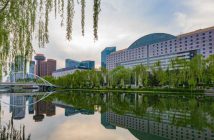
In a city with millions of inhabitants, it’s easy to get lost in the vast numbers and forget that those numbers relate to people. Beijing’s a melting pot of cultures influenced by people from far and near. The Beijing Kaleidoscope series gives you a snippet in to the lives of both expats and locals to show their diverse perspective on the city they call home.
Ji Won An came to Beijing four years ago and works as the general manager of Gates Academy, a private education institution that caters to students age 12-18. The 27-year-old decided to come to the capital alone after being offered a good job. An teaches diverse subjects, and likes to play the violin, and visit eateries in her spare time. Kicking off this series, An has an interesting outlook on the place she’s called home for some time.
What other cities/countries have you been to/lived in before you came here?
I’ve been to Malaysia and lived there for one year. Spent some time in Canada and US as well. I have also been to Canada and the States.
How would you describe life in Beijing compared to other places?
I’ve been to Shanghai a while ago, and I find that Beijing and Shanghai are very contradicting. I never thought of it before I went to Shanghai, but thinking about it now, I feel that Beijing is a very lonely city. Unlike in Shanghai, when you ask for something in English here, most of the time people don’t understand. I feel that Beijing is much more traditional. Also, everybody’s so busy, and I think Shanghai is more open to foreigners than Beijing.

What changes in Beijing are the most significant, or clear?
The weather, definitely. It wasn’t this humid before. Five years ago, it used to be very dry, and I couldn’t live without applying a lot of lotion, but it is much more humid now and I’m not using that much lotion anymore. I guess Beijing’s changing weather patterns changed my habits.
Also, Beijing is modernizing at a scarily fast pace now – it’s becoming more and more advanced. At times I’m surprised at the technology here, for example, when payments through WeChat became available.
I eat out a lot; another change that I see is the increase in restaurants in Beijing. But, most of the traditional marketplaces are disappearing, which is a regrettable thing.
If you were to paint a picture of Beijing, what would you paint and why?
I would like to paint lao (old)Beijing. I think that’s the most representative thing about Beijing. I would paint old people on the streets, either practicing taichi or playing small board games. Also lao Beijing food.

If you had only 24 hours to live in Beijing, what would you do?
First of all, I would go have a lao Beijing brunch. After that, tour palaces, such as the Summer Palace and the Forbidden City. I love palaces, especially the Forbidden City – it’s beautiful. Then I would go to a rooftop bar and enjoy the city’s night lights, which are also very pretty. But I would mostly focus on the palace tours and food.
Please complete the following: Beijing is a lonely city.
An plans on staying here for three more years. For her, the city is a blend of traditional and modern where the old and new coexist. Amidst the palaces and the night lights, with its contradicting but unique aspects, Beijing is a lonely city.
Judy Jeon, our July intern, attends the Western Academy of Beijing and decided to brave the murky waters of magazine writing. She is a writer in her school’s Roots & Shoots organization, and also leads an orchestra. With less than a year left to stay in Beijing, Judy is setting out to gather different views about the place. She likes to read, hang out with friends, and can be found exploring Chinese culture around the hutongs.
Photos: Ji Won An



